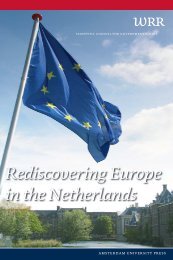The Western Condition - St Antony's College - University of Oxford
The Western Condition - St Antony's College - University of Oxford
The Western Condition - St Antony's College - University of Oxford
You also want an ePaper? Increase the reach of your titles
YUMPU automatically turns print PDFs into web optimized ePapers that Google loves.
<strong>The</strong> <strong>Western</strong> <strong>Condition</strong>: Turkey, the US and the EU in the New Middle East<br />
be sure, the Commission did thoroughly revisit the so called “European Neighbourhood Policy”<br />
(<strong>of</strong> which the UfM is the southern flank) to reflect the fast moving changes occurring in this<br />
region, proposing in the Spring <strong>of</strong> 2011 “a partnership for democracy and shared prosperity<br />
with the Southern Mediterranean” and subsequently launching “a new response to a changing<br />
Neighbourhood”, which pledged increased support to transitional countries in terms <strong>of</strong> financial<br />
assistance, enhanced mobility and access to the EU single market in exchange for mutual<br />
accountability and shared commitment to human rights, democracy and the rule <strong>of</strong> law. 186 It also<br />
made available an additional €1.2 billion on top <strong>of</strong> the €5.7 billion already committed to the ENP<br />
to be used in advancing its goals <strong>of</strong> democratic institution building and inclusive and sustainable<br />
economic growth and development. But it is has resorted to using mainly the instrument <strong>of</strong><br />
“National Action Plans” to renegotiate its relations with individual countries in the region rather<br />
than the multilateral framework <strong>of</strong> the UfM.<br />
Hence, the EU has been particularly active in revolutionary Tunisia, assisting in and monitoring<br />
the country’s first free elections in decades and providing extensive technical and institutional<br />
support in its constitution making process. 187 But its involvement and influence diminishes<br />
significantly as one moves from the Maghreb to the Mashreq, while it has no leverage in the Gulf<br />
region. For example, the EU’s presence in post-Mubarak Egypt has been negligible, vastly<br />
overshadowed by the role played by the US, Saudi Arabia, Turkey and even Qatar, both in terms<br />
<strong>of</strong> financial assistance and political influence. In the Syrian civil war, the EU has been a reactive<br />
rather pro-active player and has largely followed the lead <strong>of</strong> the United <strong>St</strong>ates. While it is true<br />
that it was Tunisia that provided the first spark <strong>of</strong> the Arab uprisings, it will most likely be in the<br />
countries <strong>of</strong> the Mashreq, especially in Egypt and Syria, where the dominant socio-political and<br />
geostrategic dynamics <strong>of</strong> the post-Arab Spring Middle East are going to be shaped. <strong>The</strong>refore it<br />
is imperative for the EU to make itself a more relevant actor in these countries.<br />
In contrast to the EU, and as discussed at the outset <strong>of</strong> this paper, the Turkish presence in the<br />
Mashreq has been much more prominent, but also more controversial – indeed a growing<br />
majority <strong>of</strong> Syrians viewed Turkish government’s policy vis-à-vis their countries negatively in<br />
Trade Area – Is It Time To Be Optimistic about the Future?’, FOCUS on the Free Trade Area, Institut Europeu de<br />
la Mediterrània, June 2010.<br />
186 ‘A partnership for democracy and shared prosperity with the Southern Mediterranean’, Joint Communication to<br />
the European Parliament, the Council, the European Economic and Social Committee and the Committee <strong>of</strong> the<br />
Regions, European Commission, Brussels, 8 March 2011.<br />
http://ec.europa.eu/europeaid/where/neighbourhood/documents/communication_conjointe_mars_2011_en.pdf.<br />
‘A new response to a changing Neighbourhood’, Joint Communication to the European Parliament, the Council, the<br />
European Economic and Social Committee and the Committee <strong>of</strong> the Regions, European Commission, Brussels, 25<br />
May 2011.<br />
http://ec.europa.eu/europeaid/where/neighbourhood/documents/communication_conjointe_mai_2011_en.pdf.<br />
187 See ‘Neighbourhood Co-operation Priorities for Tunisia 2012 – 2014’, Council <strong>of</strong> Europe, DGProg/Inf(2012)3<br />
rev, 23 March 2012, https://wcd.coe.int<br />
69

















